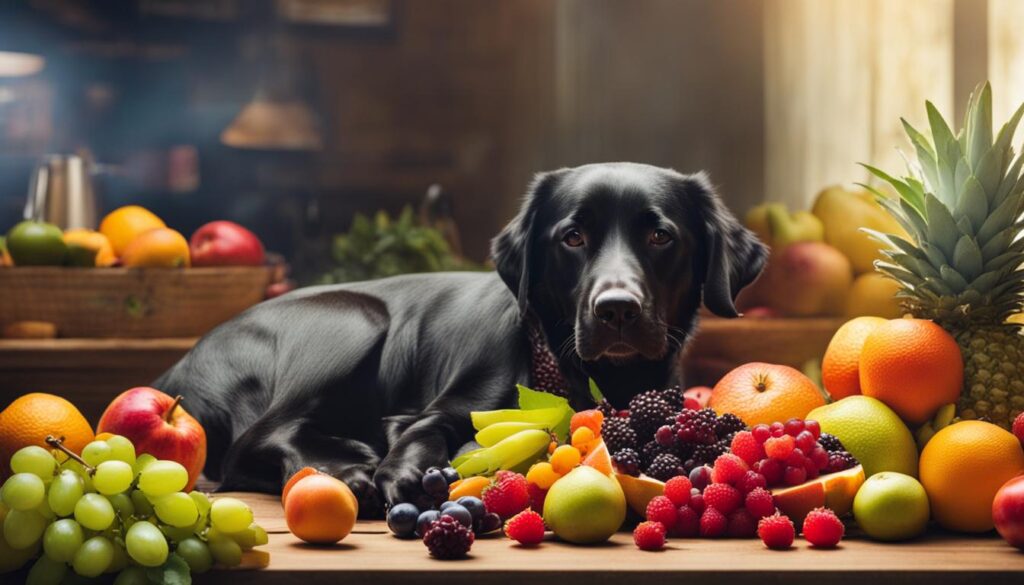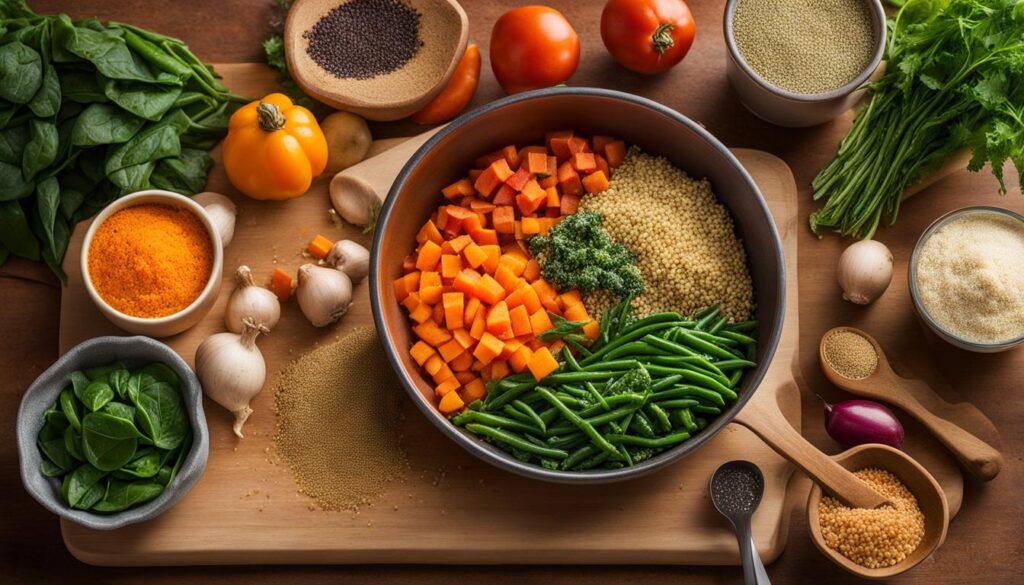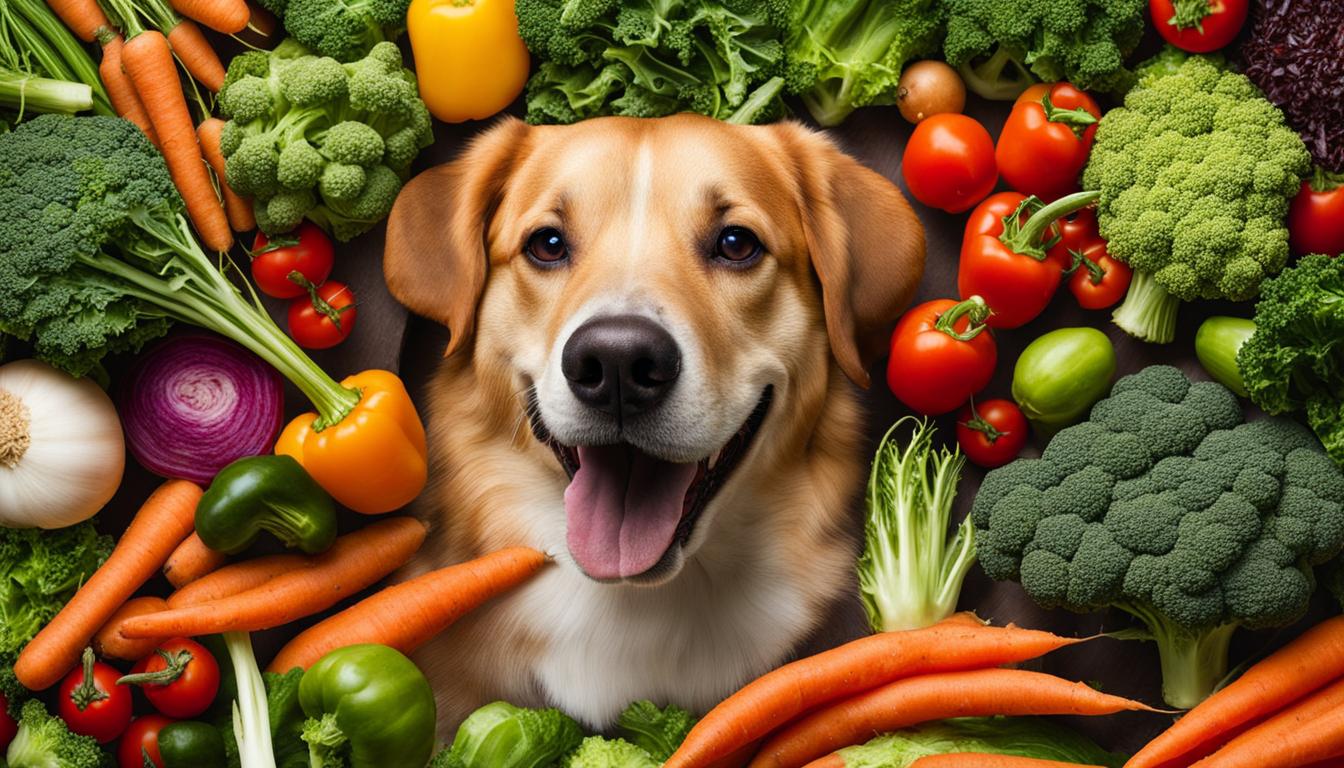Feeding vegetables to your furry friend can be a game-changer for their health and happiness. Just like humans, dogs need a balanced diet that includes a variety of organic foods and nutrients. Incorporating nutritional vegetables into their meals can provide numerous benefits, while also saving you money on expensive pet store trips.
Vegetables are packed with fiber, minerals, antioxidants, enzymes, and phyto-nutrients that are not found in meat. By feeding your dog a variety of vegetables, you ensure that they receive a wide range of essential nutrients to support their overall well-being.
So, what are the best ways to prepare vegetables for your furry friend? How can you ensure that they are getting the most out of these nutrient-packed veggies? Let’s dive into the world of vegetable-enriched dog diets and discover some tasty recipes that your pup will love!
Key Takeaways:
- Feeding vegetables to dogs provides numerous health benefits.
- Vegetables are rich in fiber, minerals, antioxidants, enzymes, and phyto-nutrients.
- Properly preparing vegetables is important for optimal digestion.
- There are many dog-friendly vegetables to include in your pup’s diet.
- Avoid feeding dogs toxic fruits and vegetables.
How to Prepare Vegetables for Dogs
When it comes to incorporating vegetables into your dog’s diet, proper preparation is key. By following a few simple techniques, you can ensure that your furry friend gets the most nutritional benefits from their vegetable-rich meals and treats.
Chopping and Cooking Techniques
Start by chopping the vegetables into small, bite-sized pieces. This not only makes it easier for your dog to eat but also reduces the risk of choking. Whether you choose to blanch or steam the vegetables, both methods can enhance digestibility and make the nutrients more bioavailable for your dog. Blanching involves briefly boiling the vegetables, followed by a quick plunge into ice water to retain their vibrant color and nutrients. Steaming is another popular method, as it helps to preserve the vegetables’ natural flavors and textures.
Pureeing for Easy Digestion
If you want to take it a step further, pureeing the vegetables can be an excellent option. Pureed vegetables break down the cell walls, making them even easier for your dog to digest and absorb the nutrients. A great way to make mealtime more fun and interactive is by freezing pureed vegetables in ice cube trays. These frozen veggie treats can be a refreshing snack for your dog, especially during warmer months.
| Veggie | Nutritional Benefits |
|---|---|
| Kale | Rich in vitamins K, A, and iron |
| Spinach | Contains potassium, magnesium, and vitamins B6, B9, and E |
| Carrots | Provide vitamin A, potassium, and vitamin B6 |
| Green Beans | Packed with iron, calcium, and vitamins B6, A, C, and K |
Now that you know how to prepare vegetables for your dog, it’s time to start incorporating these nutrient-rich foods into their diet. Whether you opt for homemade meals, treats, or a combination of both, your dog will benefit from the added nutritional value of vegetables. With a little creativity and some tasty recipes, you can create vegetable-enriched dog treats and meals that your canine companion will love.
Dog-Friendly Vegetables to Include in Your Dog’s Diet
When it comes to incorporating vegetables into your dog’s diet, there are several options that are both safe and nutritious. Including a variety of vegetables in your dog’s meals or using them as snacks or treats can provide them with essential vitamins, minerals, and antioxidants. Let’s explore some dog-friendly vegetables that are beneficial for your furry friend:
Kale for Dogs
Kale is an excellent addition to your dog’s diet as it is packed with vitamins K, A, and iron. These nutrients support your dog’s bone health and overall well-being. You can lightly steam or blanch kale before serving it to your dog to enhance its digestibility. Remember to remove the tough stems and chop the leaves into small, manageable pieces to prevent choking hazards.
Spinach for Dogs
Spinach is another nutritious vegetable that can benefit your dog’s health. It contains potassium, magnesium, and vitamins B6, B9, and E, which support various bodily functions. Blanched or lightly steamed spinach can be added to your dog’s meals or incorporated into homemade treats. Just like with kale, make sure to chop the spinach leaves into small, safe pieces for your dog to consume.
Carrots for Dogs
Carrots are not only crunchy and delicious but also provide several health benefits for dogs. They are rich in vitamin A, potassium, and vitamin B6. Carrots can be served raw as a snack or grated and added to your dog’s meals for added texture and taste. These vibrant vegetables are also great for dental health as they help clean your dog’s teeth and freshen their breath.
Green Beans for Dogs
Green beans are a wonderful vegetable to include in your dog’s diet. They are low in calories and high in vitamins and minerals such as iron, calcium, and vitamins B6, A, C, and K. Green beans can be served raw, steamed, or lightly cooked. They can be a great addition to your dog’s meals or a nutritious treat option. Just make sure they are cut into small pieces to prevent any potential choking hazards.
| Vegetable | Nutrients | Preparation |
|---|---|---|
| Kale | Vitamins K, A, and iron | Lightly steam or blanch, remove tough stems, and chop into small pieces |
| Spinach | Potassium, magnesium, and vitamins B6, B9, and E | Blanch or lightly steam, chop into small pieces |
| Carrots | Vitamin A, potassium, and vitamin B6 | Serve raw as a snack or grated and added to meals |
| Green Beans | Iron, calcium, and vitamins B6, A, C, and K | Raw, steamed, or lightly cooked, cut into small pieces |
Remember, every dog is unique, and their dietary needs may vary. It’s always a good idea to consult with your veterinarian before introducing new foods into your dog’s diet. By including these dog-friendly vegetables, you can provide your furry friend with a balanced and nutritious diet that supports their overall health and well-being.
Other Beneficial Vegetables for Your Dog’s Diet
Aside from the popular vegetables mentioned earlier, there are several other veggies that can provide great benefits to your dog’s diet. These vegetables include broccoli, beets, celery, and cucumber. Each of these vegetables brings its own unique nutritional profile to the table, supporting your dog’s overall health and well-being.
Broccoli
Broccoli is not only a favorite among humans but also a fantastic addition to your dog’s diet. It is rich in vitamins C and K, as well as potassium, which are essential for improving bone density and heart health in dogs. Additionally, the high fiber content in broccoli aids in digestion and supports a healthy weight for your furry friend.
Beets
Beets are another vegetable that can provide numerous health benefits for dogs. They are packed with vitamins C, fiber, folate, manganese, and potassium, which support digestion and boost immune health. The natural antioxidants found in beets help combat inflammation and promote overall well-being.
Celery
Celery is a low-calorie vegetable that offers a range of benefits for dogs. It contains vitamins A and C, which act as antioxidants, helping to protect cells from damage. Celery also provides dietary fiber, which aids in digestion and can help promote a healthy weight in dogs.
Cucumber
Cucumbers are hydrating and refreshing, making them an excellent vegetable to include in your dog’s diet. They are rich in water content, which helps keep your dog hydrated. Cucumbers also provide anti-inflammatory benefits, thanks to their high antioxidant content. They are low in calories and can serve as a healthy snack for your furry companion.
Table: Nutritional Profile of Other Beneficial Vegetables
| Vegetable | Nutrients | Health Benefits |
|---|---|---|
| Broccoli | Vitamin C, Vitamin K, Potassium, Fiber | Improves bone density, supports heart health, aids digestion, promotes a healthy weight |
| Beets | Vitamin C, Fiber, Folate, Manganese, Potassium | Supports digestion, boosts immune health, combats inflammation |
| Celery | Vitamin A, Vitamin C, Fiber | Acts as an antioxidant, aids digestion, promotes a healthy weight |
| Cucumber | Hydration, Anti-inflammatory benefits | Keeps your dog hydrated, provides anti-inflammatory benefits |
Including these vegetables in your dog’s diet can offer a wide range of nutritional benefits. Whether you choose to incorporate them into homemade meals or serve them as healthy treats, your furry companion will appreciate the added variety and nutrition. Just remember to introduce new vegetables gradually and monitor your dog’s reaction to ensure they tolerate and enjoy them. As always, consult with your veterinarian for specific dietary recommendations based on your dog’s individual needs.
Toxic Fruits and Vegetables to Avoid Feeding Your Dog
While many fruits and vegetables can be a healthy addition to your dog’s diet, it’s important to be aware of the ones that can be toxic to them. Feeding your dog these harmful foods can lead to serious health issues and should be avoided at all costs. Here are some toxic fruits and vegetables that you need to keep away from your furry friend:
Toxic Fruits for Dogs
- Grapes: Grapes and raisins can cause kidney damage in dogs, leading to symptoms such as vomiting, diarrhea, and decreased appetite.
- Onions and Garlic: These vegetables can cause damage to your dog’s red blood cells, leading to anemia. Symptoms may include weakness, pale gums, and increased heart rate.
- Chives: Chives contain a compound that can damage your dog’s red blood cells and cause anemia. Symptoms may include pale gums, weakness, and decreased appetite.
- Persimmons: The seeds and pits of persimmons can cause intestinal blockages in dogs, leading to symptoms such as vomiting, diarrhea, and abdominal pain.
Toxic Vegetables for Dogs
- Mushrooms: Some mushrooms contain toxins that can cause a wide range of symptoms in dogs, including vomiting, diarrhea, abdominal pain, and even liver damage.
- Rhubarb: Rhubarb leaves contain high levels of oxalic acid, which can affect your dog’s digestive system, leading to symptoms such as drooling, vomiting, and diarrhea.
If your dog accidentally consumes any of these toxic fruits or vegetables, it’s crucial to seek immediate veterinary attention. Even small amounts of these foods can have serious consequences for your furry friend’s health. Remember to always keep these harmful foods out of your dog’s reach and provide them with safe and nutritious alternatives instead.

Table: Toxic Fruits and Vegetables for Dogs
| Fruits | Vegetables |
|---|---|
| Grapes | Mushrooms |
| Raisins | Rhubarb |
| Onions | |
| Garlic | |
| Chives | |
| Persimmons |
Benefits of Feeding Vegetables to Dogs
Feeding vegetables to dogs provides numerous benefits. Not only do vegetables help alkalize the body, but they also support digestion and provide essential nutrients for your furry friend. Vegetables are packed with vitamins, minerals, antioxidants, and phytonutrients that promote overall health and prevent chronic diseases. Incorporating a vegetable-rich diet into your dog’s daily meals can have a positive impact on their well-being.
One of the key benefits of feeding vegetables to dogs is the support it provides to their digestive system. Vegetables are high in fiber, which aids in digestion and helps regulate bowel movements. The fiber content in vegetables can also promote a healthy gut by supporting the growth of beneficial gut bacteria.
Another advantage of a vegetable-rich diet is the hydration it provides. Many vegetables have a high water content, which helps keep your dog hydrated and supports their overall health. Hydration is important for proper organ function, joint health, and maintaining healthy skin and coat.
“A vegetable-rich diet for dogs can support their immune system and help prevent the onset of chronic diseases.”
Table: Benefits of Feeding Vegetables to Dogs
| Benefit | Description |
|---|---|
| Alkalizes the body | Vegetables help maintain a balanced pH level in the body, promoting overall health and well-being. |
| Supports digestion | The fiber content in vegetables aids in digestion and promotes a healthy gut by supporting beneficial gut bacteria. |
| Provides essential nutrients | Vegetables are rich in vitamins, minerals, antioxidants, and phytonutrients that are essential for your dog’s health. |
| Hydrates the dog | Many vegetables have a high water content, helping to keep your dog hydrated and supporting their overall health. |
| Boosts the immune system | A vegetable-rich diet can support your dog’s immune system, helping to prevent the onset of chronic diseases. |
By incorporating a variety of vegetables into your dog’s diet, you can provide them with a well-rounded and nutrient-rich meal. Remember to introduce new vegetables gradually and consult your veterinarian for specific dietary recommendations for your dog. With the right balance of vegetables and other essential nutrients, your furry friend can enjoy the numerous benefits of a vegetable-rich diet.

Table: Comparison of Homemade Vegetable Dog Meals and High-Fiber Dog Food Options
| Homemade Vegetable Dog Meals | High-Fiber Dog Food Options | |
|---|---|---|
| Nutrition | Control over ingredients Customizable for specific dietary needs |
May contain a variety of vegetables Additional fiber for digestion |
| Convenience | Requires preparation and cooking time | Ready-to-serve Less time-consuming |
| Cost | May be more affordable | Can vary depending on brand and quality |
| Variety | Endless possibilities for ingredient combinations | Wide range of flavors and formulations |
Conclusion
Incorporating vegetables into your dog’s diet can be a game-changer for their overall health and well-being. By providing essential nutrients, fiber, and antioxidants, a vegetable-rich diet can support their digestion, boost their immune system, and even help prevent chronic diseases.
When it comes to preparing vegetables for your furry friend, remember to chop them into small, dog-friendly pieces to prevent choking. Blanching or steaming the vegetables can make them more digestible and pureeing them can make it easier for your dog to enjoy all the benefits. You can even freeze pureed vegetables into convenient ice cube treats!
Some dog-friendly vegetables to include in their diet are kale, spinach, carrots, and green beans. These nutrient powerhouses can be incorporated into homemade meals or served as healthy snacks and treats. Just be sure to avoid toxic fruits and vegetables such as grapes, onions, and mushrooms, as they can be harmful to your dog’s health.
So go ahead and get creative with your dog’s diet! With the right approach and a variety of dog-friendly vegetables, you can provide them with a balanced and vegetable-rich diet that they will love. Consult your veterinarian for specific dietary recommendations and explore the world of dog vegetable diet recipes to keep your furry friend happy and healthy.
FAQ
Can dogs eat all types of vegetables?
While many vegetables are safe and nutritious for dogs, there are some that can be toxic. It’s important to avoid feeding dogs grapes, raisins, onions, garlic, chives, persimmons, peaches, plums, apricots, cherries, mushrooms, and rhubarb.
How should I prepare vegetables for my dog?
To prepare vegetables for dogs, you should chop them into small pieces to prevent choking. They can be blanched or steamed to enhance digestibility. Pureeing vegetables can also be beneficial as it breaks down the cell walls, making them easier to digest.
Can I use frozen vegetables for my dog?
Yes, you can use frozen vegetables for your dog. Freezing pureed vegetables in ice cube trays can provide convenient and healthy treats for dogs.
How can I incorporate vegetables into my dog’s diet?
Vegetables can be included in homemade meals by steaming or pureeing them and mixing them with protein sources like meat. They can also be added to commercial dog food as a topper or used to make homemade treats.
What are the benefits of feeding vegetables to dogs?
Feeding vegetables to dogs provides numerous benefits such as supporting digestion, providing essential nutrients, boosting the immune system, and promoting overall health. Vegetables also help maintain a healthy weight and prevent chronic diseases.
Can vegetables help with my dog’s digestion?
Yes, vegetables can support gut health in dogs. They are rich in fiber, which aids digestion and promotes regular bowel movements.
Are there commercial dog foods available that contain vegetables?
Yes, there are high-fiber dog food options available that contain vegetables to support digestion and overall health. These can be a convenient way to incorporate vegetables into your dog’s diet.
Should I consult a veterinarian before changing my dog’s diet?
It is always recommended to consult a veterinarian before making any significant changes to your dog’s diet. They can provide specific dietary recommendations based on your dog’s individual needs.





